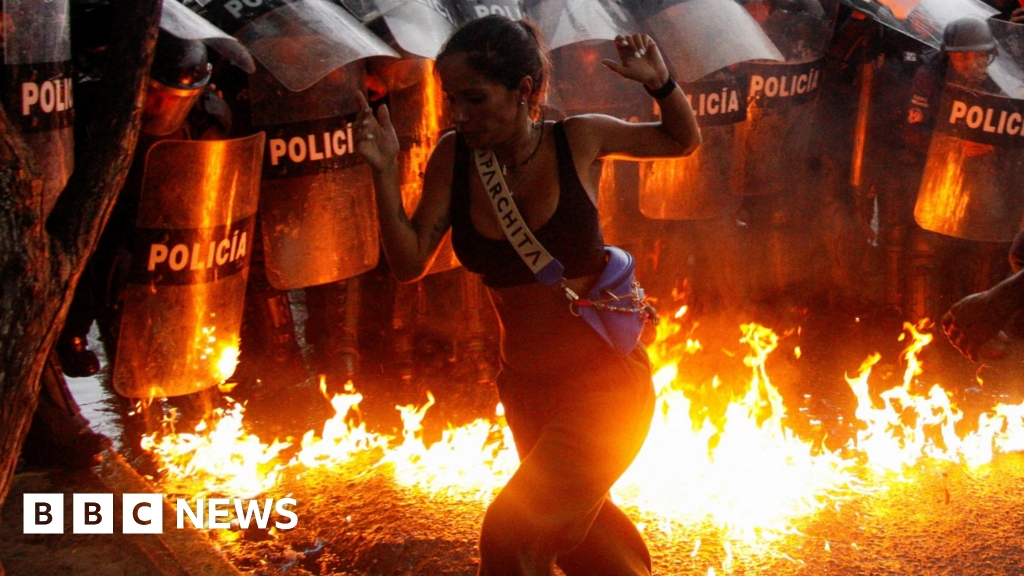- author, Ione Wells
- role, BBC News, Caracas
-
Venezuelan security forces fired tear gas and rubber bullets at protesters challenging the results of Sunday's election.
Thousands of people flooded central Caracas on Monday evening, some walking miles from the slums in the mountains surrounding the city to the presidential palace.
Protests erupted in the Venezuelan capital the day after President Nicolas Maduro declared victory.
The opposition has disputed Maduro's victory claim as fraudulent and says its candidate, Edmundo Gonzalez, won in a landslide victory with 73.2% of the vote.
Pre-election polls suggested a clear victory for the challenger.
Amid widespread discontent over the country's economic crisis, the opposition had rallied behind Gonzalez in a bid to oust President Maduro after 11 years in power.
Many Western and Latin American countries, as well as international organizations including the United Nations, have called on Venezuelan authorities to release voting records from individual polling stations.
Argentina is among the countries that have refused to recognise Maduro's election victory, and Venezuela has responded by recalling its diplomats from Buenos Aires.
Diplomats from six Latin American countries – Chile, Costa Rica, Panama, Peru, the Dominican Republic and Uruguay – were also deported over what Foreign Minister Ivan Gil described on social media as “interventionist actions and rhetoric”.
A large military and police presence, including water cannons, was deployed on the streets of Caracas to disperse protesters and prevent them from approaching the presidential palace.
The crowd chanted “Freedom, freedom!” and called for the overthrow of the government.
Footage showed burning tyres on the highway, large crowds gathering in the streets and police on motorbikes firing tear gas.
In some areas posters of President Maduro were torn down and burned, and tires, cars and trash were also set on fire.
Armed police, army troops and left-wing paramilitary groups sympathetic to the government clashed with protesters and blocked many roads in the city centre.
The BBC spoke to several people who took part in the protest, which took place in a densely populated area known as La Lucha, or “the fight”.
Paola Zarzalejo, 41, said the vote was “terrible, fraudulent. We won with 70 percent of the vote and they've done it again. They've taken the election from us again.”
“We want a better future for our young people and our country.”
Her father, Miguel, 64, agreed. “He lost the election. He has no right to be here now.”
He added: “We want a better future for our young people, otherwise they will leave the country. A future where they can work hard and earn well. Our country is rich and he is destroying everything.”
“If all the young people leave, Venezuela will only have old people, elderly people.”
Cristobal Martinez, draped in a Venezuelan flag, said he believed the election was “rigged.”
He said the majority of young people in La Lucha and the surrounding area voted in an election that is particularly important for young people because “many of us are unemployed” and “the majority are not studying.”
“It was the first time in my life that I went to vote. I was there from 6am until about 9am and saw a lot of people mobilised on the streets.”
“There was a lot of dissatisfaction with the government. A majority of the population was participating and wanted change.”
He said that “nothing changed” during Maduro's long tenure and that “the situation has only gotten worse since Chavez died.”
He criticised some older people who were sympathetic to the government for living on bonuses and food handouts, but said: “We want change. We want decent jobs and a good future for our country.”
“We hope that people from other countries will help us so that we don't have another disaster like the ones we had before,” Martinez said.
Maduro accused the opposition of calling for a coup by contesting the election results. “This is not the first time we've faced a situation like the one we're facing today,” he said.
“They are trying to stage another fascist and counter-revolutionary coup in Venezuela.”
Venezuela's attorney general warned that anyone blocking roads as part of protests or violating laws related to unrest would be dealt with with the full force of the law, and said 32 people had been detained on charges ranging from destroying election materials to inciting violence.
Meanwhile, senior U.S. government officials said the results released were “inconsistent with data available through the rapid counting system and other sources, suggesting the results released may not represent how people voted.”
That, they added, is “our primary cause for concern.”
“That is why we are calling on Venezuela's electoral authorities to release the underlying data that supports the figures they have released.”
The United States has not yet said what the results mean for its sanctions policy against Venezuela, but officials have stressed that while the results are in doubt, President Maduro called the elections and allowed opposition candidates to appear on the ballot, even though opposition leaders were barred from running.
The Organization of American States (OAS) announced late Monday that it would hold a permanent council meeting on Wednesday to discuss Venezuela's election results.

